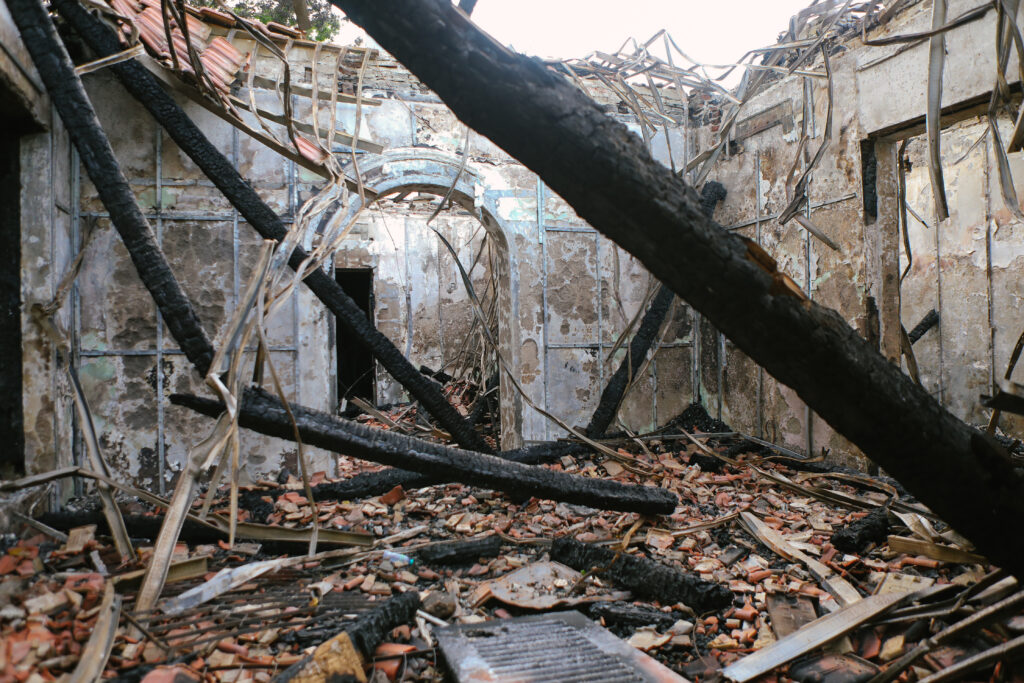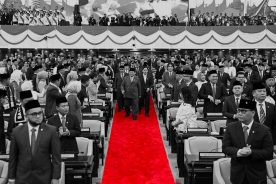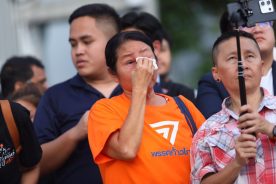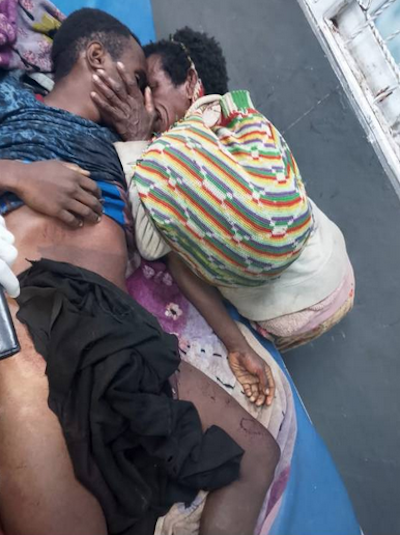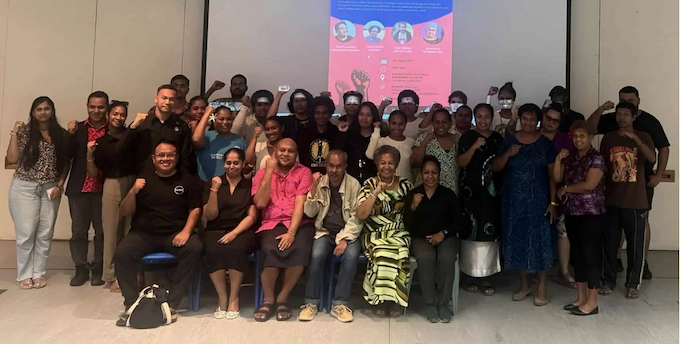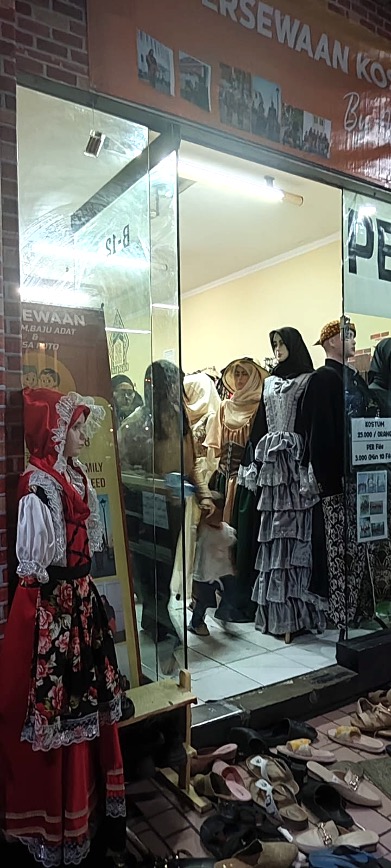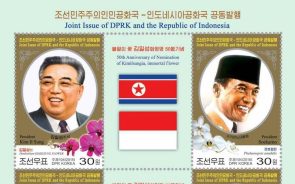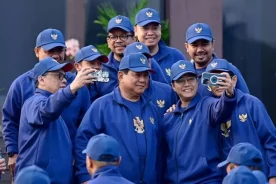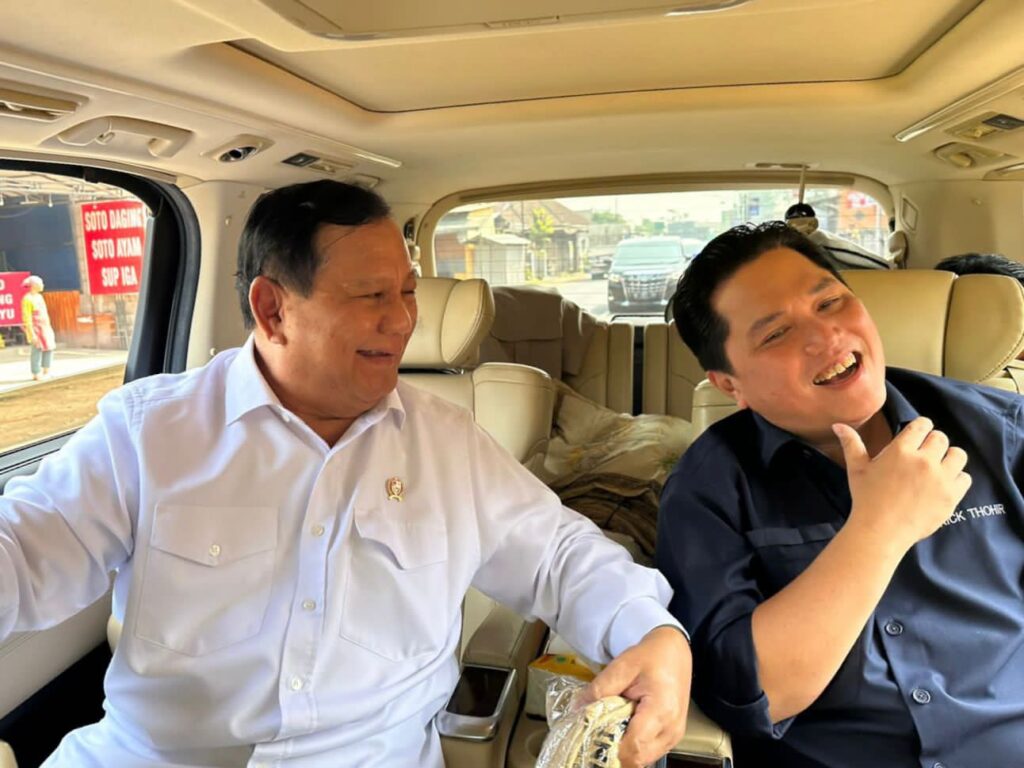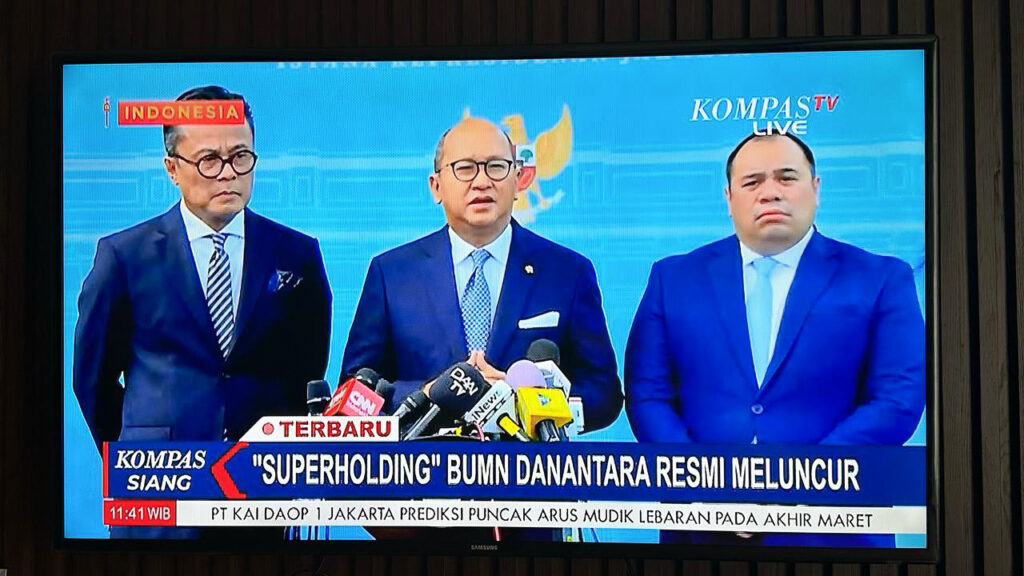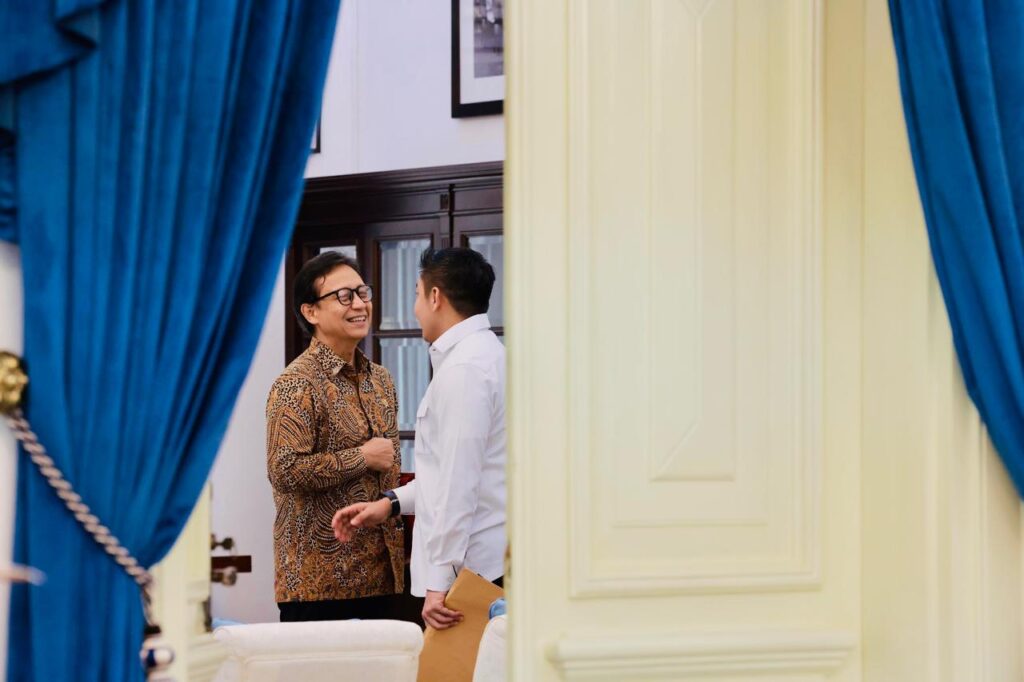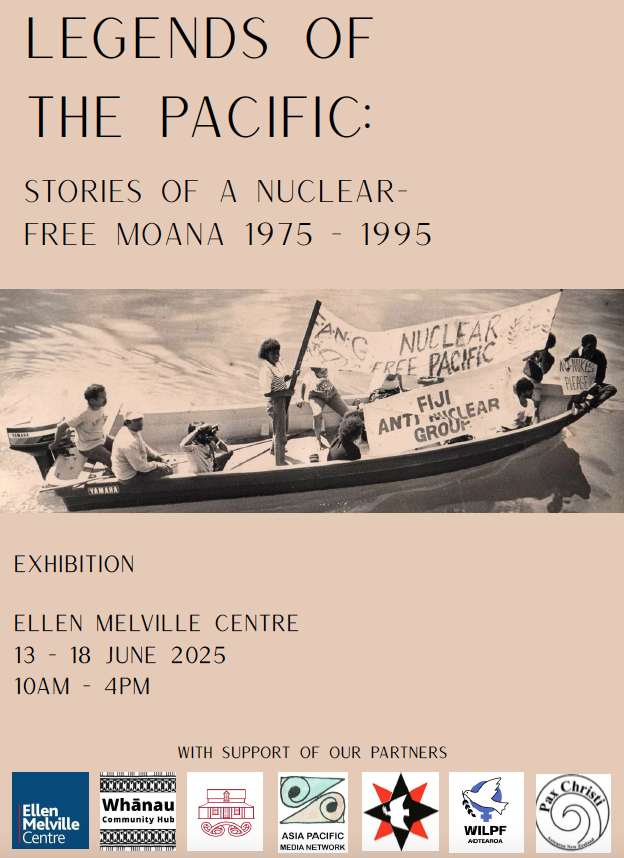“They treated us like animals! Even when you move a chicken or a dog, you set up a temporary cage first,” exclaimed Hasan as he watched his home, along with the homes and workspaces of dozens of others, be razed to the ground in North Jakarta’s Sunter Agung neighbourhood in 2019. Setiyo, a neighbour, shook his head, recalling the days of authoritarian rule: “People said we are in a time of reformasi, but it feels just like Suharto’s era. They [the government’s forces] came with arms and weapons like they wanted to go to war.” The previous day had seen violent clashes as residents scrambled to shield their homes and workplaces from demolition by government authorities.
The North Jakarta Deputy Mayor said the demolition was needed to restore the waterway’s flow, prevent flooding, and make way for a jogging track to create a more “friendly and healthy” environment. An offer of relocation to public housing in Marunda, a neighbourhood two hours away by public transport, was rejected by many residents, who feared the move would cost them their communities and livelihoods as used goods sellers. With nowhere else to go, some evicted residents constructed makeshift shelters just across the street.

After eviction in Sunter Agung, residents rebuilt makeshift shelters across the street, November 2019. (Photo: author)
Just a few kilometres away, however, the story unfolded differently. Families across Muara Angke’s kampung—self-built settlements of low-income residents, often without secure land or infrastructure but bound by strong social ties—still live with broken drains and under constant threat of eviction. By contrast, residents of Kampung Akuarium, demolished in 2016, fought successfully to have their neighbourhood rebuilt as a state-backed, community-designed vertical kampung.
The contrasting fates of these communities are not anomalies, but the rule. Jakarta’s informal settlements have been built on unstable political ground throughout Indonesia’s history, from independence through the authoritarian New Order regime, and into post-reformasi democracy. Government responses consistently swing between eviction and embrace of informal residents, swayed by a complex interplay of interests, power, and narratives. I call this pattern “discretionary urbanism”: a way of governing the city through selective enforcement and shifting application of rules. This ambiguity is less about weak institutions than political strategy. Urban development in Jakarta works not despite such inconsistency but because of it, allowing informality to persist while giving elites room to pursue power, profit, or prestige.
But in the democratic era, another force is coming into play. The opening of political opportunities has led to a rise in grassroots activism, allowing communities to adopt what urban scholar Faranak Miraftab calls “insurgent planning”—bottom-up interventions that bypass and contest state-led development by creating alternative infrastructures and governance models. Their tactics include forging political contracts with gubernatorial candidates, forming cooperatives to secure land, and even rebuilding their own neighbourhoods with self-managed systems for waste disposal, sanitation, and environmental protection. Through insurgent planning tactics like these, Jakarta’s marginalised citizens are no longer merely surviving the system but reshaping the city from the ground up, proving that when they are united, their communities are far from powerless.
My doctoral research explored why and how Jakarta’s discretionary urbanism shapes the fate of informal settlements. Prevailing theories often assume a uniform logic of global capitalist expansion, elite capture, or colonial legacies that inevitably displace the poor. Jakarta’s reality is far more contradictory, swinging between coercion, neglect, and care. To unravel this puzzle, I combined historical analysis, ethnography, and comparisons across regimes, leaderships, and neighbourhoods. I conducted fourteen months of archival research, fieldwork in five kampung, interviews, and media analysis. I found that the outcomes are shaped as much by leaders’ political interests, the power of community organising, and competing public narratives as by structural pressures. Rather than passive spaces of exclusion, informal settlements emerge as arenas where authority is contested, and urban futures are actively negotiated.
Informality as a reality
Jakarta’s informal settlements are living examples of the complexities of urbanisation sweeping across Southeast Asia. As cities like Bangkok, Manila and Jakarta continue to expand, millions of people are funnelled into informal neighbourhoods that lack essential services yet power the urban economy. In Indonesia, nearly a third of the urban population—about 30.4 percent in 2018—live in slums, informal settlements, or inadequate housing, with around three million residents in Greater Jakarta lacking basic infrastructure. Despite their vital contributions to the labour force and city life, these communities confront evictions and neglect, impacted by arbitrary government responses.

Kampung housing along a polluted canal in Muara Baru, North Jakarta, reflecting government neglect of basic services and infrastructure, August 2019 (Photo: author)
Informality is positioned in contrast to the “formal”, particularly in relation to state regulations and bureaucratic systems. Hernando de Soto argued that the informal economy represents the people’s spontaneous and creative response to the government’s failure to meet their basic needs. But government actions also shape the emergence of informal settlements — and in many cases, informality is partly by design.
When rule of law is weak, after all, local leaders like governors or mayors wield wide discretion, often prioritising their vested interests over consistent application of policy. Responses to informal settlements by Indonesian governments reflect this: when settlements align with leaders’ priorities they may be tacitly allowed or even encouraged, but when they are seen as obstacles to economic development or modernisation, local authorities may resort to violent evictions.
Informal by design
In the early years of Indonesia’s independence, informal settlements emerged not merely as a consequence of urbanisation but as a direct result of government policies. During the transition from Dutch rule to independence after the Second World War, both the central Indonesian government and the Jakarta administration played a crucial role in shaping these settlements.
Initially, the Jakarta government embraced informal land occupation as a form of resistance against colonial rule. During the chaos of the Indonesian Revolution and the subsequent Dutch reoccupation, local authorities encouraged citizens to squat on land to undermine Dutch governance. Jakarta’s then mayor, Sudiro (1953–1960), recalled this strategy in his memoir, where he disclosed that the Indonesian leaders themselves “on purpose… incite the people, to occupy empty lands, regardless of who owns the land.” A lack of enforcement of property rights further allowed squatters to establish homes on contested lands. My archival research uncovered a letter sent to Sudiro by residents of Central Jakarta’s Salemba Tegalan neighbourhood, who explained that they had occupied the land and built houses as a “compulsory act… with the intention of destroying and complicating the development plans of Gemeente Batavia” by the Allied army. Driven by the political turmoil, these actions inadvertently contributed to an informal urban sprawl.
As the Jakarta government grappled with a housing crisis worsened by rapid urban migration, discriminatory and counterproductive housing policies were introduced that further fuelled the expansion of informal settlements. Public housing was primarily allocated to civil servants and the military, while development projects favoured the upper middle class. Affordable housing schemes or land price controls were absent, while kampung were excluded from the supervision of the Housing Affairs Office. As a result, the poor had little option but to construct their own homes on vacant land. The administration’s failure to provide adequate housing and its intentional neglect of low-income communities directly contributed to the proliferation of informal settlements throughout the city.
Under Sukarno, prestige projects were prioritised over public welfare. Major modernisation initiatives, such as the construction of Jakarta’s landmark National Monument (Monas) and infrastructure for the 1962 Asian Games, led to the widespread displacement of long-term residents in the inner city. Poorly executed relocation strategies pushed residents to occupy informal land, as many chose to remain near the source of their livelihoods rather than relocate far from their communities.
Sukarno claimed that prioritising the poor was equal to opposing broader national interests, illustrating the disconnect between the state’s ambitions and the reality of urban poverty. In a 1965 speech to parliament, he scoffed: “There is a leader who says don’t demolish illegal huts, we must remember the poor people! What kind of leader is this, they only remember the interests of that person, that group of people!” Here, Sukarno pitted the poor against the national interest, framing evictions as necessary for progress. Thus, what began as a tactic of resistance and state-building laid the groundwork for a city where informality remains both a survival strategy for the poor and a tool of power for elites.
Shifting motives and policies of the New Order
Discretionary urbanism persisted even under the high-ranking military officers appointed to lead Jakarta under the New Order regime (c1967–1998). Some governors combined evictions, neglect, and improvement schemes, their choices shaped primarily by immediate political and economic priorities. In short, local leaders even in an authoritarian regime retained agency in deciding which “hands of the state” they would move.
One of the best-remembered governors of this period, Ali Sadikin (1966–1977), employed an ambidextrous approach by pairing mass evictions with distributive initiatives like the Kampung Improvement Program. Sadikin’s dual strategy arose from a vision of Jakarta as a modern international city attractive to investors, while also tackling housing shortages. Kompas reported in September 1969 that thousands of households were cleared during his tenure, even as unprecedented funds were channelled into kampung upgrading.
Sadikin justified this contradiction by invoking fear and hope. In a 1971 interview with Kompas, he warned Jakarta risked becoming “a second Calcutta” if slums were left unchecked, adding it was better to “sacrifice several thousand now” to save millions in the future. In a 1969 speech, he argued that an “orderly and healthy kampung” would make residents more productive. These dual framing legitimised evictions while allowing the government to project a benevolent image through its improvement schemes.
Sadikin’s successor, Tjokropranolo (1977–1982), took a more permissive approach, leading to a significant reduction in evictions despite facing similar economic pressures. Rather than resorting to force, he focused on maintaining social stability, aware of the political climate and the need to gain support from opposition groups—particularly Islamic factions and the poor after the contested 1977 elections. In line with this strategy, during a 1979 session of Jakarta’s parliament, Tjokropranolo stated that migrants and the urban poor “also have their rights and share in building this city.” He championed their right to live and work in Jakarta as part of his vision for a “socialist-religious Jakarta society.”
The remaining governors of this period—Suprapto, Atmodarminto and Soedirdja—shifted back to stricter policies. Evictions escalated to restore order and authority they believed had been weakened by Tjokropranolo’s leniency. Suprapto began by re-disciplining local officials, telling them to “be orderly first before bringing order to others” (Kompas, October 1982). Atmodarminto pushed for the demolitions of informal houses to “maintain the authority of the government” (Tempo, November 1987). Soedirdja went further, promoting a disciplined society in line with Jakarta’s real estate boom, capped by a 1994 decree envisioning the capital as a city of skyscrapers. Together, they underscored how discretionary urbanism under the New Order swung back toward repression, with political motivations, particularly the maintenance of authoritarian control, took precedence over considerations for community welfare.
Throughout the New Order era, leaders used contradictory narratives to justify their choices and make them seem necessary. Informal residents were depicted alternately as illegal occupiers who undermined city planning and public order, or as a “safety valve” that absorbed housing shortages and self-reliant citizens embodying Indonesia’s spirit of mutual cooperation, gotong royong. This discursive flexibility allowed governors to swing between eviction and accommodation, aligning their actions with shifting political and economic interests.
The rise of urban poor activism
The “consistent inconsistency” of previous decades has carried over through the post-reformasi period. Sutiyoso, whose governorship spanned the reformasi period from 1997 to 2007, fluctuated between harsh evictions and brief periods of leniency. He evicted thousands of families, including more than 8,500 in 2003 alone, in the name of flood prevention and public order. His successor, Fauzi Bowo (2007-2012), the first directly-elected governor, continued this punitive trajectory, evicting around 3,200 families.
Joko Widodo (2012–2014) experimented with more negotiative approaches, such as constructing a nearby social housing project for families displaced by reservoir development in Muara Baru. He launched an on-site redevelopment initiative using the concept of kampung deret (row kampung), planned for 74 sites. Basuki Tjahaja Purnama, or “Ahok” (2014–2017), presided over one of Jakarta’s most aggressive eviction waves, displacing more than 8,000 families and 6,000 business in 2015 alone. Instead of focusing on in-situ redevelopment, Ahok prioritised relocation to distant rental flats (rusunawa), often with little to no negotiation. Anies Baswedan (2017–2022) shifted again, introducing accommodative policies such as the Community Action Plan. However, implementation was uneven, with some kampung receiving substantial redevelopment while others faced neglect or demolition.
In the midst of ongoing volatility, movements and organisations representing the urban poor have become increasingly important. As democratisation, decentralisation, and human rights paradigm gained momentum, the military’s dominance receded, creating a more favourable environment for activism. The Urban Poor Consortium (UPC), founded in 1997, brought together activists, architects, and journalists to address urban poverty. From this network, the Urban Poor People’s Network (JRMK) emerged in 2009, quickly expanding its reach to 26 kampung and various informal groups across Jakarta. These organisations offer community leadership training, advocacy support, and networks that empower residents to engage with political leaders. Their rise and resilience signal a growing ability of the urban poor to influence government actions and shape policy.
One tactic used by urban poor organisations to engage in formal politics has been the use of “political contracts”—agreements that outline specific community demands in exchange for electoral support. UPC tested this strategy during Jakarta’s first direct gubernatorial election in 2007 and refined it in subsequent contests. Political contracts forged by urban poor organisations have led to meaningful policy changes, especially concerning land, housing and livelihood security. During the 2017 gubernatorial election, for example, urban poor networks allied with Anies Baswedan and Sandiaga Uno, who pledged to stop evictions and prioritise on-site improvements and land reform. The resulting policy changes exemplify how urban poor movements can leverage strategies to secure concessions from political candidates.

Public discussion between JRMK-affiliated kampung residents and Governor Anies Baswedan during the Commemoration of Human Rights Day in Kampung Krapu, December 2019. (Photo: author).
Community power in action: rebuilding futures in North Jakarta’s kampung
The degree of success in the implementation of these pro-poor policies, however, largely depends on the strength of community power—shaped by informal leadership, community cohesion, political connections, and strategic capabilities—is essential for residents to effectively influence government actions.
Two informal settlements in North Jakarta, Kampung Akuarium and Kampung Tongkol, have demonstrated the power of community-driven initiatives through insurgent planning. Their strength comes from internal leadership and cohesion, combined with external alliances with urban poor networks, professionals, and political groups. In both neighbourhoods, residents developed alternative designs and proposals, presenting a united front to government officials.
In Kampung Akuarium, the community came together after their neighbourhood was demolished in 2016 under then-Governor Ahok. Many residents chose to stay put in the rubble, mounting resistance and asserting their rights. Driven by proactive leaders, the community built connections with professionals-activists, such as the Rujak Centre for Urban Studies, and political figures, strengthening their demands for redevelopment and inclusion in government plans. A diverse team conducted workshops to assess local needs and create a shared vision for their future as a maritime tourism destination. The cohesive community, united in purpose and action, proposed viable alternatives that addressed both their needs and government interests.
During Anies Baswedan’s governorship, the community proposed plans that not only responded to concerns about displacement but also aligned with government goals. Legal strategies such as securing land ownership and forming cooperatives, enabled them to navigate bureaucratic processes effectively. This approach led to the construction of Kampung Susun Akuarium, a five-storey collective housing complex for the community that was inaugurated in 2021. Funded through government schemes requiring developers to contribute to affordable housing, Kampung Susun illustrates the power of collective action. Their experience shows how strategy, leadership, and cohesion transformed resistance into negotiation and, ultimately, renewal.
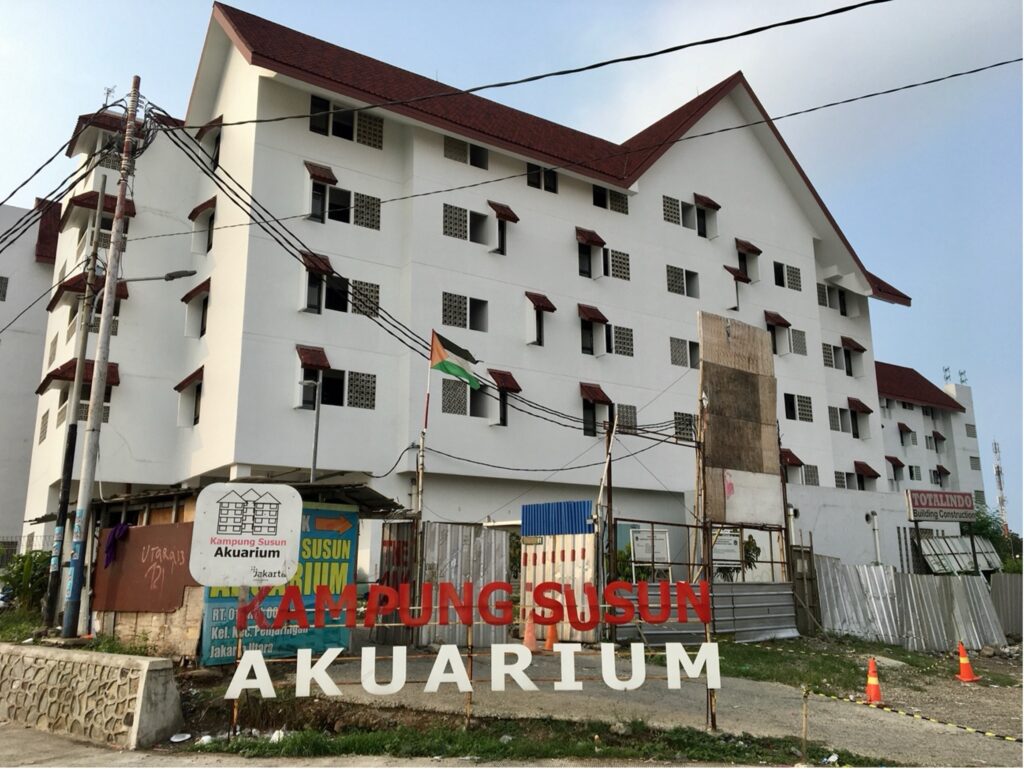
The rebuilt Kampung Akuarium: a five-storey vertical kampung developed through community action and government partnership, July 2024. (Photo by author)
Kampung Tongkol was threatened with demolition as part of a flood mitigation plan in 2015. Instead of waiting for eviction, residents organised as a community to partner with the city government in its plans for sustainable development. They voluntarily removed houses within five meters of the river to create buffer zones, reoriented homes to face the river, and implemented community-based systems for waste and sanitation. To strengthen their case, the community collaborated with Architecture Sans Frontières Indonesia and the University of Indonesia to build Rumah Contoh, a three-storey eco-friendly prototype that now houses seven families. By framing themselves as guardians of the Ciliwung River, they countered perceptions of informal settlements as illegal and positioned themselves instead as partners in Jakarta’s environmental strategies.
Together, these kampung show how community-driven urbanism thrives on collaboration over subordination, gradual transformation over abrupt displacement, and flexible networks over rigid hierarchies. The result is collective housing with stronger ownership, accountability, and resilience than most state-led schemes. Grassroots planning processes—organising communities, creating working groups, collaborating with facilitators and architects, and engaging in lengthy deliberation—can transform how planning works, shifting the relationship between planners, bureaucrats, and citizens.
Charting a new course
As urbanisation accelerates in Southeast Asia, Indonesia’s informal settlements pose both challenges and opportunities. President Prabowo Subianto’s bold promise to construct three million houses a year—for a total of 30 million homes if re-elected—aims to address Indonesia’s housing backlog, which BPS put at 9.9 million in 2023. However, analysts warn that the program still treats housing primarily as a commodity rather than a right, disproportionately benefiting developers, banks, and financial markets while pushing low-income families into long-term debt. For Prabowo’s mission to be effective, the government must move beyond eviction and token upgrading. One lesson from Jakarta’s kampung is that insurgent planning—where communities organise, design, and negotiate their own futures—offers a more durable path. These practices show how informal settlements already provide housing, livelihoods, and networks for the urban poor, despite neglect and threat.
A more promising approach would be to embrace this functional view of informality. This means institutionalising not only the management of settlements but also co-production with residents. The experience of Jakarta’s kampungs already point to innovative moves: collective land and housing management through cooperatives, the formal recognition of vertical kampung housing, and the push to establish a housing agency that would give communities a permanent seat in decision making. Embedding facilitators and architects into these processes would ensure that community-led planning is not an exception but part of the city’s governance fabric.
The broader moves are for city governments to adopt a long-term vision that extends beyond reactive measures. This will involve addressing the root causes of informality, including deep economic inequality, rapid rural migration, insecure land tenure, and limited access to affordable housing, while also building accountable governance and ensuring consistent policy implementation.
Ultimately, the future of Jakarta—and cities across Southeast Asia—hinges on the ability of governments to comprehend that the city does not just happen to its people; it is built by them. And that means the only sustainable way forward is to finally, and meaningfully, plan with the people who call it home.
••••••••••
This post is part of a series of essays highlighting the work of emerging scholars of Southeast Asia published with the support of the Australian National University College of Asia and the Pacific.
The post Insurgent planning versus discretionary urbanism in Jakarta appeared first on New Mandala.
This post was originally published on New Mandala.




